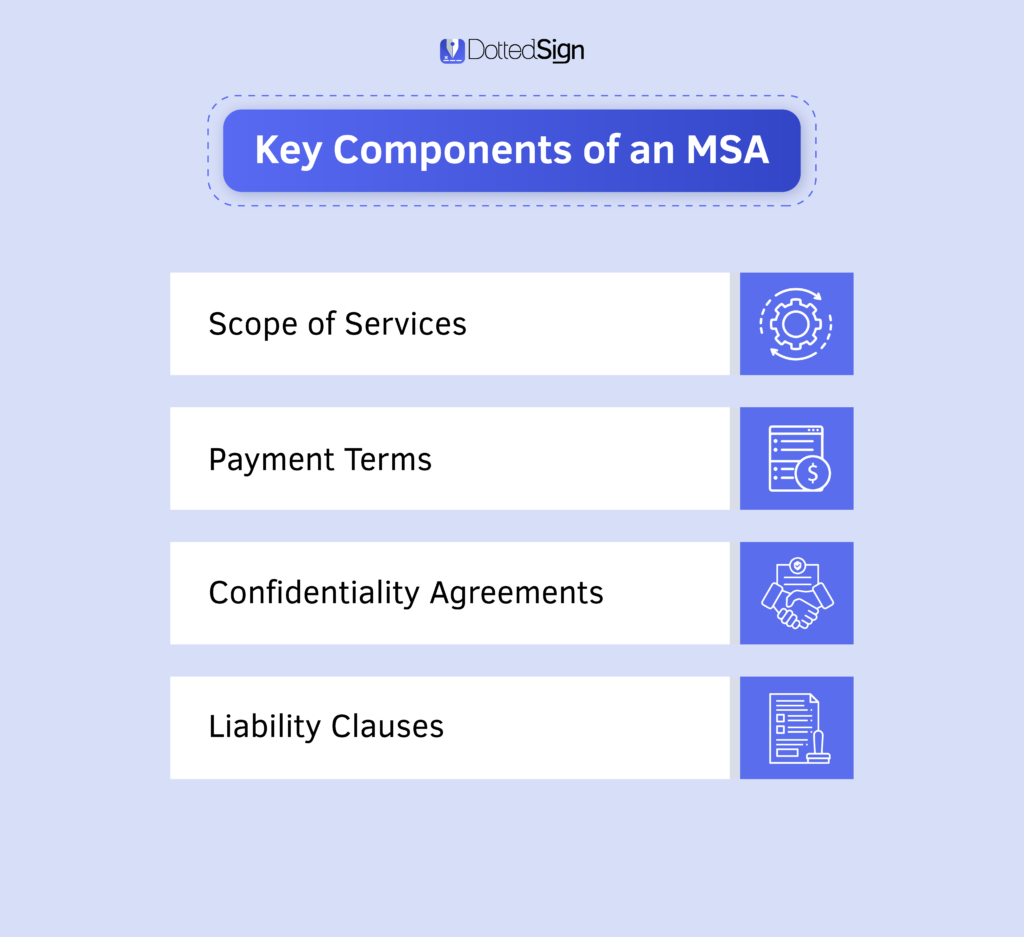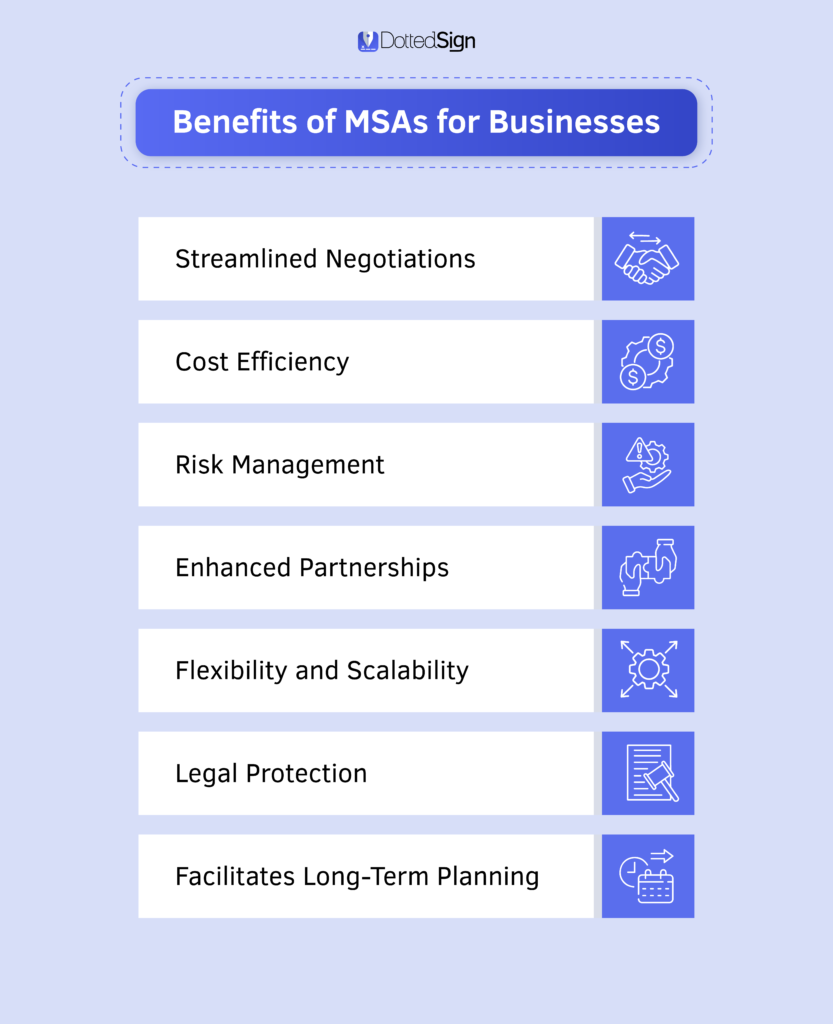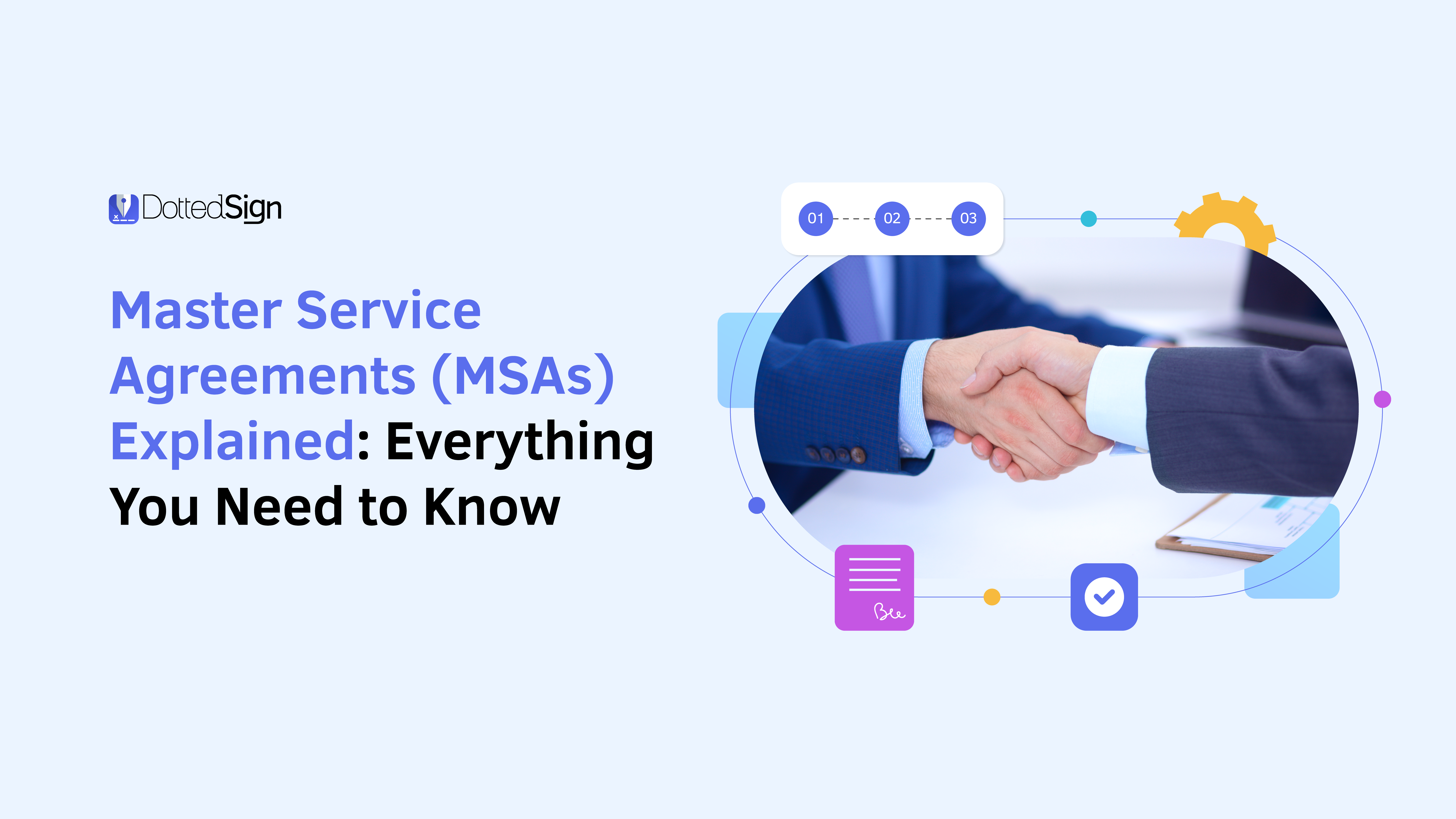Master Service Agreements (MSAs) Explained: Everything You Need to Know
A Master Service Agreement (MSA) is essentially a contract that lays the foundation for your prospective business relationships.
Think of it as an overarching rulebook that defines how you and your business partner will work together, covering everything from the scope of work and conditions for termination to payment terms and confidentiality clauses.
Drafting an MSA is like setting the ground rules for a game, ensuring both teams play fairly and understand what is expected. Put simply, this electronic contract is crucial for smooth operations and minimizing misunderstandings down the road.
Keep reading to learn what MSAs are all about, why they are vital to successful business collaborations, and how you can craft effective MSAs.
Key Components of an MSA
To understand what this contract type entails, let us dive into the nuts and bolts of an MSA. Here are the four core components of an MSA you should be familiar with:
- Scope of Services: This section is your blueprint, outlining the services or products to be delivered. It is where you define the project’s boundaries, ensuring both parties have a mutual understanding of the work involved. It helps in managing expectations and preventing scope creep.
- Payment Terms: Here, you detail the financial dealings, including payment schedules, milestones, and conditions. This clarity prevents disputes over money, ensuring a smoother business relationship.
- Confidentiality Agreements: These protect sensitive information shared during the partnership. It is crucial for maintaining trust and integrity, ensuring that trade secrets or proprietary information are not disclosed illicitly.
- Liability Clauses: These sections clarify responsibilities and liabilities, addressing who is accountable for specific risks or damages. This clarity is vital for managing risk and safeguarding your business interests.

Besides these key aspects, MSAs can also include other important sections such as:
- Duration: Specifies the contract’s effective dates and term length.
- Termination Clauses: Outlines conditions under which either party can terminate the contract.
- Renewal Options: Details if and how the MSA contract can be renewed after the initial term ends.
- Dispute Resolution: Defines the process for resolving disputes, including mediation or arbitration.
- Insurance Requirements: Specifies types and amounts of insurance each party must maintain.
- Amendment Procedure: Explains how changes to the contract can be made.
- Governing Law: Identifies the state or country laws that govern the agreement.
- Notices: Details how formal communications should be sent between parties.
- Assignment: Conditions under which the agreement’s responsibilities can be assigned to another party, such as the use of subcontractors or freelancers.
- Quality Control: Specifies standards and procedures for ensuring the quality of services or products provided.
- Indemnification: Outlines provisions for compensating any party for losses or damages arising from the agreement, including liability protection clauses.
As you may have guessed, drafting MSAs can be a laborious process. But when you consider the benefits of doing so at the start of a lasting business relationship, you will realize that the effort is worth it.
Benefits of MSAs for Businesses
MSAs are used by organizations in various industries providing open-ended services, such as information technology, finance, manufacturing, and more.
Here are a few key reasons why businesses invest upfront resources into drafting MSAs:
- Streamlined Negotiations: MSAs reduce the time and effort required for negotiating terms, allowing for quicker project initiation.
- Cost Efficiency: By setting standardized terms, you can reduce legal and administrative costs associated with individual agreements.
- Risk Management: Clearly defined terms and conditions in MSAs help mitigate risks by outlining responsibilities and liabilities.
- Enhanced Partnerships: Establishing clear expectations and responsibilities fosters trust and fortifies business relationships.
- Flexibility and Scalability: MSAs provide a framework that can easily adapt to new projects or changes in business scope, facilitating growth.
- Legal Protection: Well-drafted MSAs offer legal safeguards for both parties, ensuring compliance and protecting interests.
- Facilitates Long-Term Planning: With the groundwork of collaboration clearly laid out, you can plan future projects and resources more effectively.

So, how can you craft a useful and persuasive MSA agreement?
8 Tips for Drafting Effective MSAs
By definition, an MSA is an agreement between two (or more) parties, and any agreement works best when everyone involved aligns perfectly on every front.
With that in mind, here are eight best practices for drafting effective MSAs:
- Prioritize Clarity and Specificity: Use clear language to define terms, services, and obligations. Specificity minimizes ambiguity and potential disputes.
- Ensure Flexibility for Future Changes: Incorporate provisions for modifications, allowing the agreement to adapt to changing business needs or circumstances.
- Outline Dispute Resolution Mechanisms: Define a clear process for resolving disagreements, including arbitration or mediation, to maintain relationships and ensure continuity.
- Consider Legal and Regulatory Compliance: Ensure the MSA contract adheres to applicable laws and regulations, reducing the risk of legal challenges.
- Balance the Agreement: Strive for terms that are fair and equitable to all parties, supporting mutually beneficial business relationships.
- Detail the Scope of Work Precisely: Flesh out what services will be provided, how, and by whom, to prevent scope creep and manage expectations.
- Include Termination and Renewal Clauses: Define conditions under which the agreement can be terminated or renewed, providing a clear exit strategy or continuation plan.
- Consult with Legal Experts: Engaging legal counsel to review the MSA can prevent potential legal issues and ensure everyone’s interests are adequately protected.
Now, taking an MSA from the drafting stage to a final, binding contract requires signatures from all parties. An electronic signature (eSignature) solution like DottedSign lets you streamline the signing process.
DottedSign enables secure, legally compliant eSignatures on crucial documents and contracts — such as MSAs — ensuring efficiency and reducing the time from negotiation to execution.
Its features like real-time tracking and automated notifications keep all parties informed throughout the process, enhancing collaboration and transparency. This is particularly beneficial for MSAs, where timely and secure execution of agreements is critical to project speed. Its intuitive interface allows for quick and easy onboarding, and it also supports integrations with various services including Google Drive, Gmail, Salesforce, Zapier, Microsoft Teams, and more. Sign up for a free trial to give it a spin!
Masterfully Sign Your MSAs with DottedSign
As we navigated through the nuances of MSAs, it is clear they are more than just contracts; they are foundational documents that enhance trust between partners, ensuring all sides are on the same page and committed to mutual success.
MSAs enable stronger business relationships by serving as the parent framework for all transactions between a vendor and a client. By setting clear expectations and procedures up front, MSAs simplify and speed up the negotiation process for future contracts, allowing you to focus on the work itself rather than getting bogged down in legalities with every new project.
All in all, MSAs lay the groundwork for smoother, more efficient, and more fruitful business partnerships. Using eSignature solutions like DottedSign speeds up this process, offering a seamless, secure way to capture signatures on these vital agreements. Get your free trial today!
FAQs
Q. What is a master service agreement?
A master services agreement (MSA) is a contract between parties that outlines the general terms and conditions under which all their transactions or agreements will be conducted.
Q. What does MSA mean in business?
Business MSAs streamline negotiations, reduce administrative costs, mitigate risks, and set a foundation for long-term partnerships.
Q. What key components should an MSA include?
An effective MSA agreement includes the scope of services, payment terms, confidentiality agreements, liability clauses, and termination conditions.
Q: How does DottedSign facilitate the use of MSAs?
DottedSign is the eSignature solution that simplifies the process of signing and managing MSAs, offering security, legal compliance, and efficiency.
Q: Can MSAs be modified after signing?
Yes, MSAs often include amendment procedures that allow for modifications, ensuring flexibility as business needs evolve.

